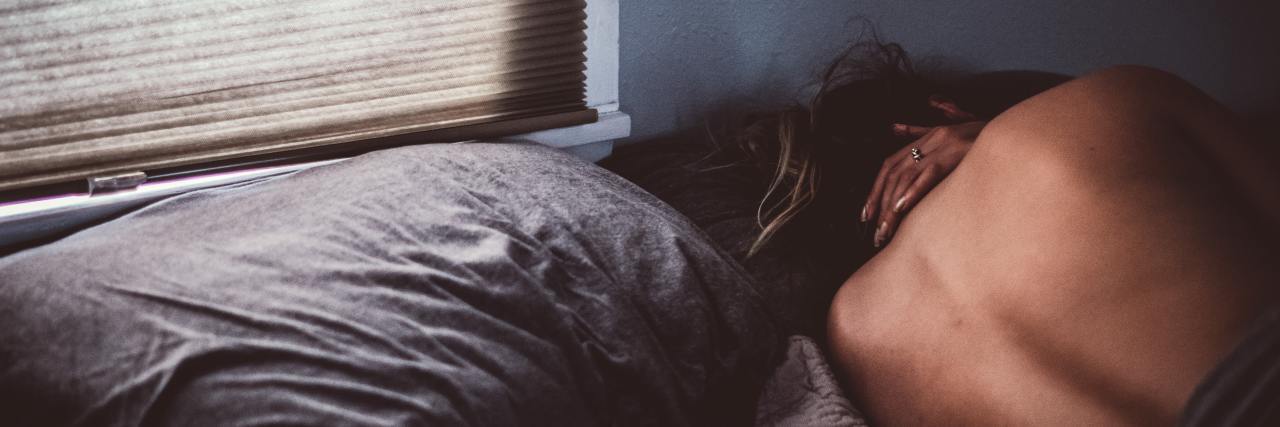One day.
5 a.m. I’m frantically Googling the percentage of people diagnosed with lymphoma at stage four, the life expectancy of lymphoma under 40 and rare side effects of chemotherapy.
1 p.m. I’m giving myself a Romberg test I saw on YouTube to see if I have sensory ataxia.
7 p.m. I’m measuring my blood pressure in eight-minute intervals to see if I have orthostatic hypotension. I take it five minutes after lying down, 30 seconds after standing up and two minutes after I sit. I lie, I sit, I stand, lie, sit, stand, lie, sit, stand. My left arm is covered in red scratches from scraping the machine cuff on and off.
Seven days.
Monday: I’m bent over the toilet with my iPhone flashlight examining my poo to see if it’s black, pencil thin, smeared with blood, yellow, floating, fatty or covered in mucus.
Tuesday: I’m taking many, many pictures of my poo. I do it with the lights on and off and then the flash on and off to get the most detailed pictures. I rush to the computer to compare it to the images of colon cancer found on MedicineNet, WebMD and the American Cancer Society’s website.
Wednesday: I’m hiding in my closet and meticulously searching my breasts for lumps, swelling, thickening, dimpling, red nipples, nipple discharge and pulling near the nipples.
Thursday: I’m taking pictures of my breasts from all angles and swiping back and forth between them to find the most detailed. I want to make sure I have the clearest one to compare to the breast cancer images found on Healthline, Mayo Clinic and the CDC’s site.
Friday: In secret, I’m downloading a microscope app to examine my skin for moles that are asymmetrical, have irregular borders, are bleeding, waxy, scabbing, scaly or red.
Saturday: I download an app that diagnoses moles, and it finds something suspicious. I anxiously wait until Monday to call my dermatologist in case I have squamous cell carcinoma, basil cell carcinoma or melanoma.
Sunday: The day of rest.
12 months.
January: I’m waiting an hour in my doctor’s waiting room for him to fill out a requisition form for a complete blood count, basic metabolic panel and lipid panel. He says, “40 is when things start to go wrong.”
February: I’m playing phone games for two hours as I wait in line to have a diagnostic mammogram and breast ultrasound. My doctor is concerned and says, “Your sister died young from breast cancer. We just need to be careful.”
March: I’m at my optometrist’s office for a full exam and she tells me to come back immediately if I start to see lots of floaters or flashing lights. “That means your retina is detaching,” she explains.
April: A month off from diagnostic tests.
May: I’m freezing on an exam table in a blue gown, naked from the waist up. My doctor hands me an ultrasound requisition form because, although he can’t feel a lump, “It’s hard to feel breast cancer in young women. Always come in as soon as you think you feel something!”
June: I’m starving for 12 hours because my bowels have to be spotless for my flexible sigmoidoscopy. My internist has me in the fetal position, in agony, searching my rectum and lower colon for inflammation, ulcers, abnormal tissue, polyps and cancer. My mom warns me, “Brandi, colon cancer runs in our family.”
July: I’m once again naked and freezing, waiting for the dermatologist to inspect my body for suspicious lesions because my mom said, “Me and all four of your siblings had skin cancer.”
August: My doctor is on holiday.
September: I’m pinched by an IV for three hours to prepare for a polypectomy and a dilation and curettage. My gynecologist is searching for uterine polyps because, “I see something suspicious on your ultrasound.”
October: My neurologist is sending me for a CT scan because she says, “Your numbness, tremor and tingling are probably just anxiety but let’s rule out any sort of brain lesion.”
November: I’m naked again, freezing again, waiting for my gynecologist to scrape my cervix because he says, “Cervical cancer is rare, but you never know.”
December: Everyone’s on Christmas vacation.
I don’t want to know all these terms and symptoms, and yet, here I am. I’ve never been diagnosed with any of these diseases, but sometimes I live like I’m preparing to die.
Can you relate? Let Brandi know in the comments below.
Unsplash image by Gregory Pappas

